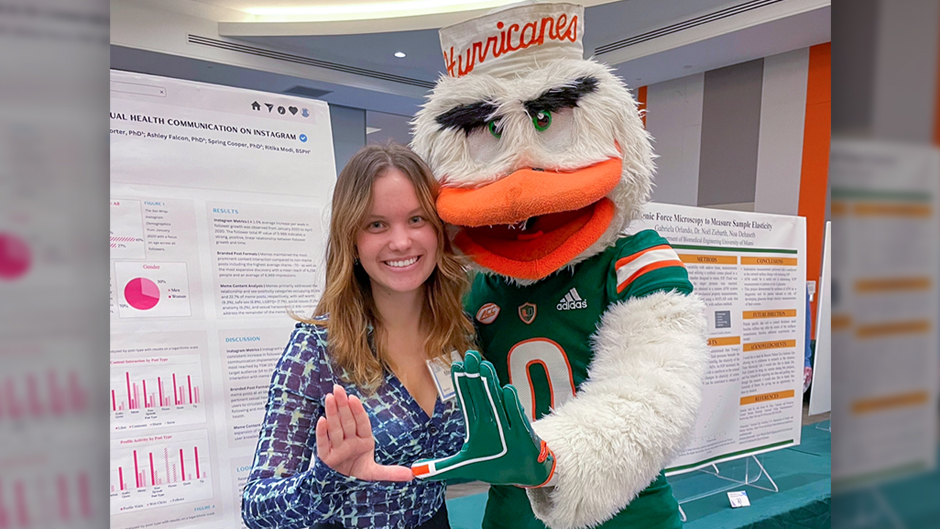From the time Megan Piller was little, she told her parents she’d be a neurosurgeon one day.
“I’ve always enjoyed health, medicine, and science,” she said. “I definitely claim to be a woman in STEM. I love it.”
Piller arrived at the University of Miami in Fall 2019 to pursue her life plan. “I came in as a dual degree student with the Department of Microbiology and Immunology as well as public health,” she said.
But her focus shifted quickly from premed to public health. “Taking public health classes was a turning point for me,” she recalled. “It opened my eyes to what I want to do. The environment was so open and collaborative and a really positive space.”
Piller soon will move to Connecticut for the Master of Public Health in Social and Behavioral Science program at Yale University, with a global health concentration.
“Public health showed me an opportunity to be incredibly proactive and make a difference in countless people’s lives, to be on the forefront and get ahead of any sort of major illness or environmental issue,” she said.
At the University of Miami, Piller served as editor-in-chief of the student-run magazine Scientifica, and her interest in sustainability and resilience includes a post as vice chair of the student-led ECO Agency.
“Megan has been an outstanding student both inside and outside of the classroom,” said Arsham Alamian, associate dean for Health Studies at the School of Nursing and Health Studies. “She has an extensive list of extracurricular activities and has made high-level contributions to the undergraduate public health program at SONHS.”
Piller, in turn, credits the School of Nursing and Health Studies faculty members for guiding her successes. “Dr. Alamian, Dr. Ashley Falcon, and Dr. Andrew Porter all served as mentors to me in different areas. The research I was able to do over the course of a few years with Dr. Porter and Dr. Alamian only reinforced my desire to continue in the field of public health.”
With Alamian, Piller created abstracts for publication and presentation, one of which, on caffeine intake and metabolic syndrome risk in children, resulted in her first author credit alongside Alamian in the journal Annals of Epidemiology.
Interning for Porter’s research lab, The Sex Wrap, inspired Piller’s final public health practicum project, “The ‘Memeification’ of Sexual Health Communication on Instagram,” which looks at the intersection between the use of social media and public health information campaigns, specifically sexual health and reproductive health education.
“The core of this initiative was meeting people, especially young adults ages 14 to 29, where they are, and a lot of the time that’s on social media nowadays. For better or worse, that’s where people are getting their information,” she said. “In public health, you have to get comfortable being uncomfortable, and that’s when you make your biggest discoveries or you’re able to learn the most.”
Piller recently submitted a manuscript with Porter, her practicum advisor, and Falcon for publication in the peer-reviewed journal Sex Education.
“That’s not something a lot of students get to do during their undergraduate career,” said Piller.
Her ultimate goals include a Ph.D. and an international career focused on women’s sexual and reproductive health.
“Our public health classes have always taught us that the wellness and success of women is reflective of the economic, political, and social wellness of a country as a whole,” said Piller. “As a female with a sister and family members who have been impacted by sexual and reproductive health laws in the U.S., it’s important to pass the baton and open up opportunities for women across the world to have the same success I’ve had and to give them freedom in regard to their reproductive and sexual health to be amazing and bold and innovative. Hopefully, my public health work can help do that—at least a little.”

